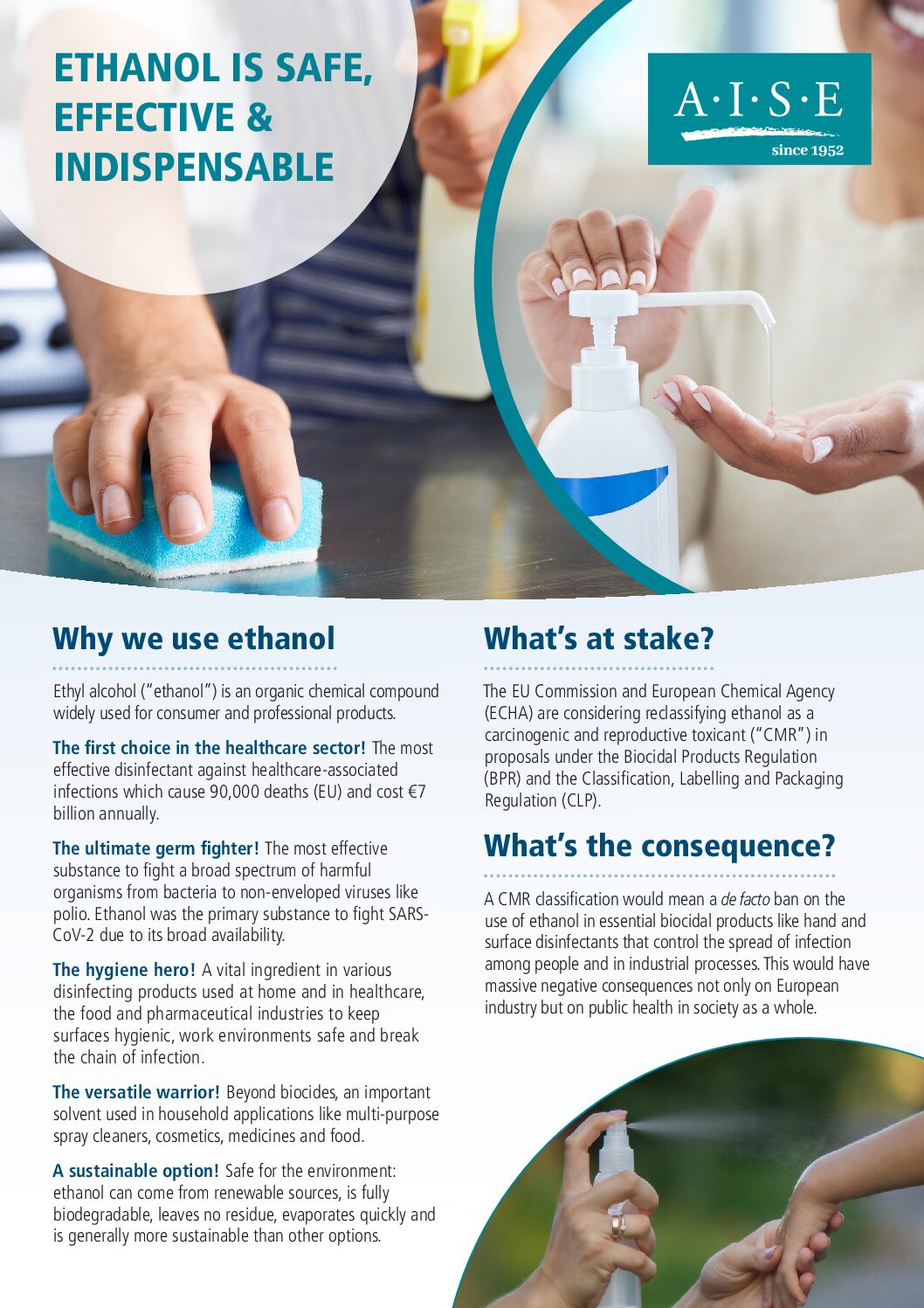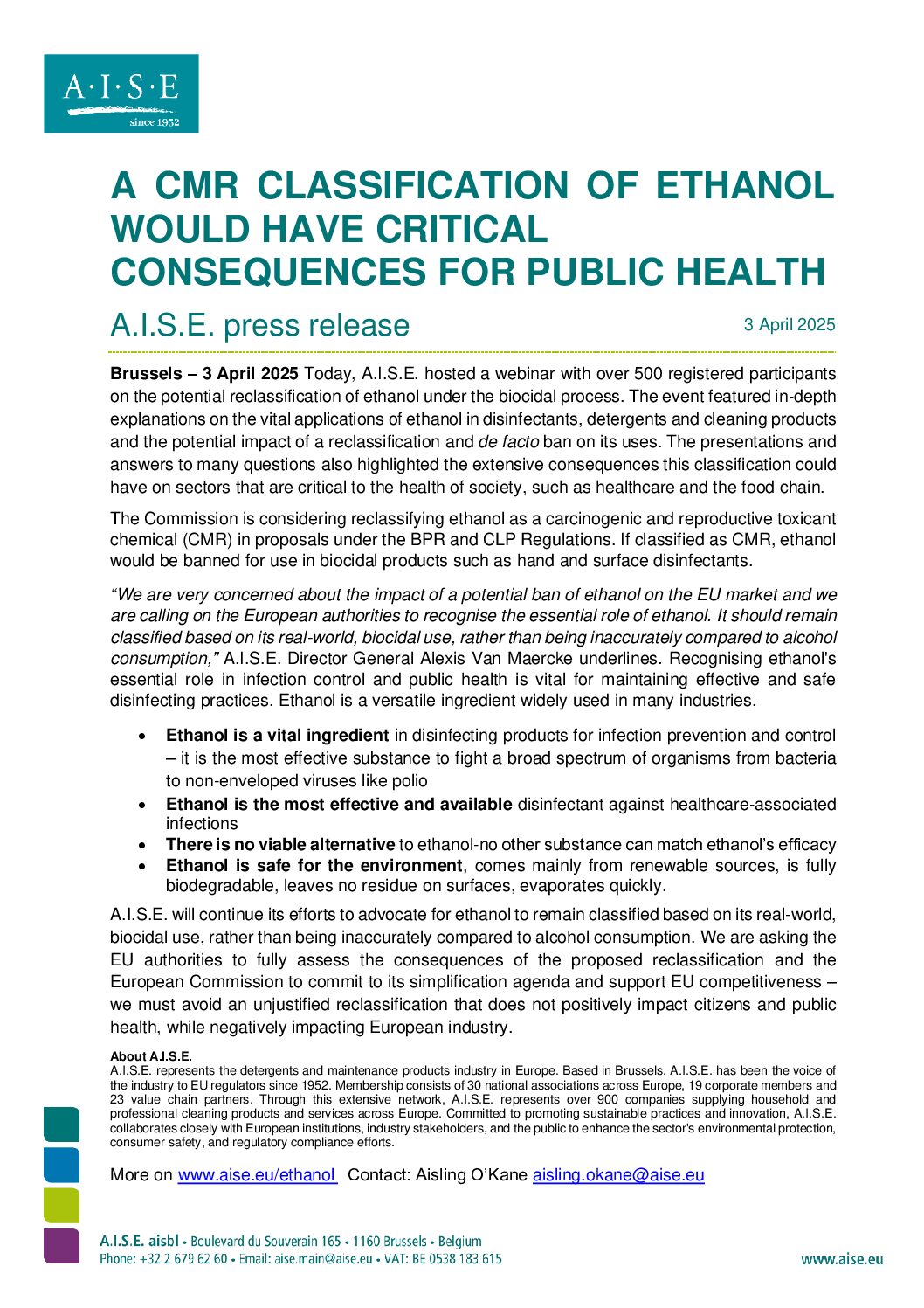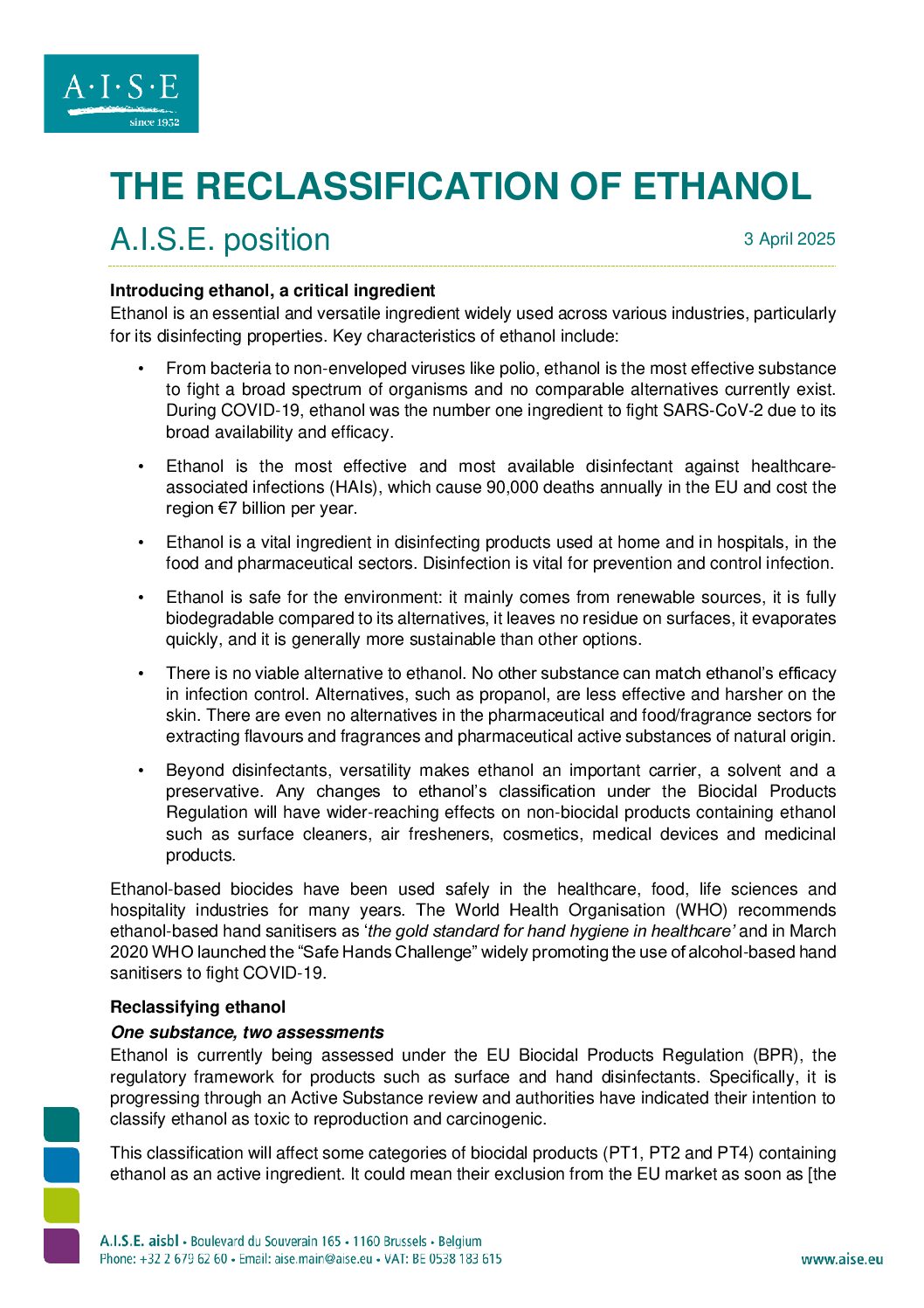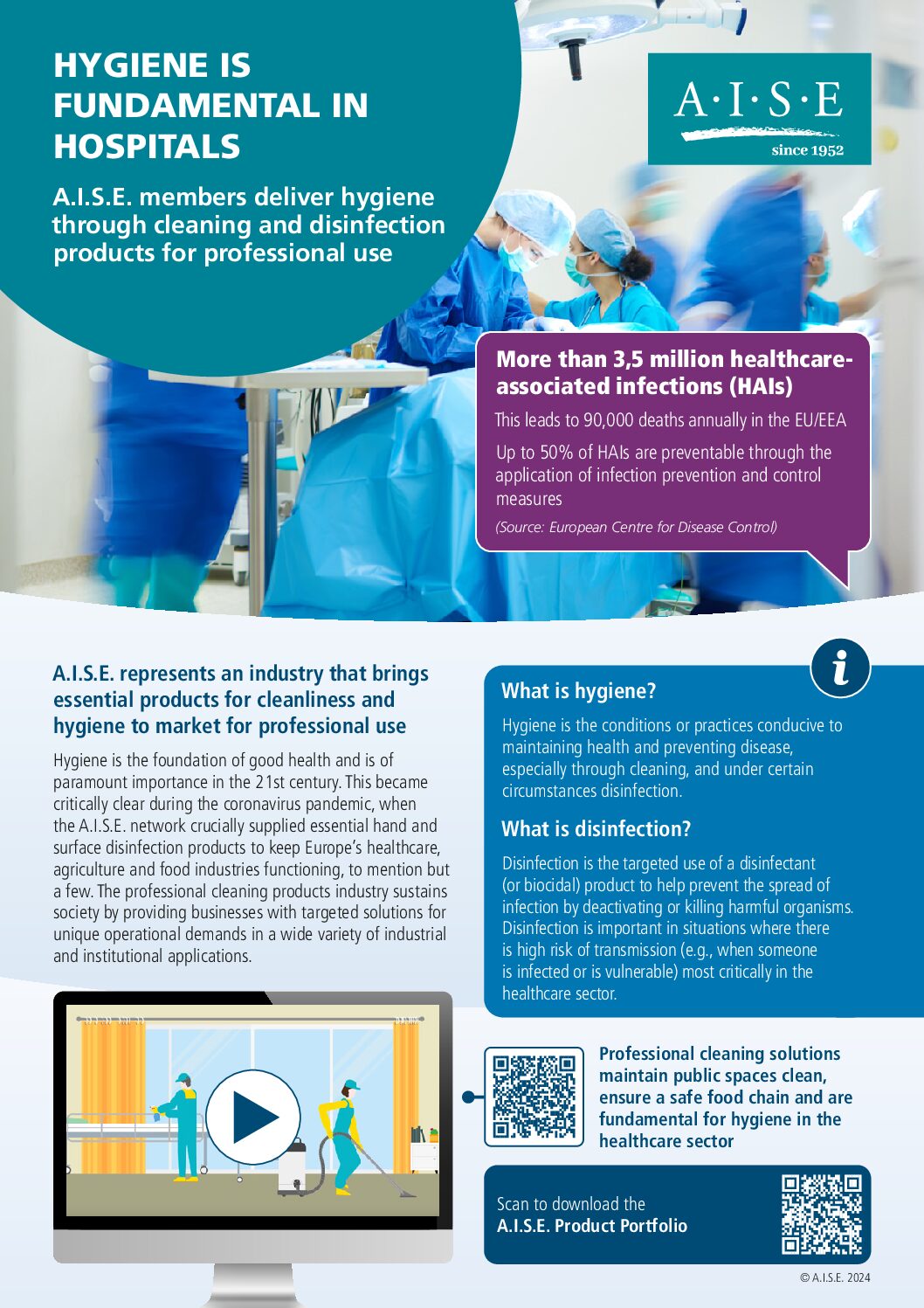
What is ethanol?
Ethanol (ethyl alcohol) is a widely used natural and versatile ingredient used in consumer products and for professional use in many industries such as the healthcare, pharmaceutical, or food sectors. Ethanol is known particularly for its disinfecting properties, and in the cleaning and maintenance products industry, it is an essential ingredient in cleaning and disinfection products, such as hand and surface disinfectants. As such, its applications are key for human health and hygiene.
How is ethanol used in detergents and disinfectants?
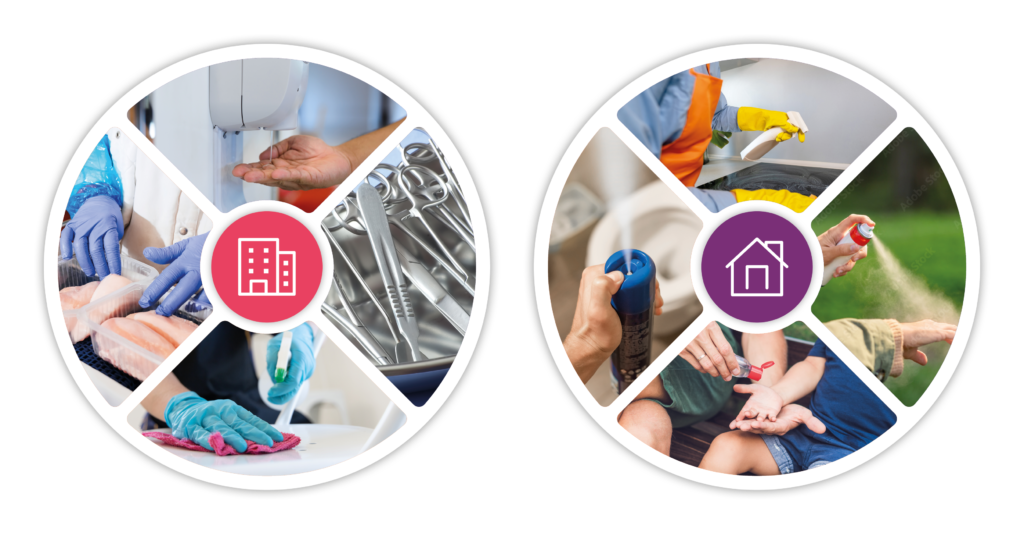
Ethanol in disinfectants and skin repellents such as insecticides has long been used as a cornerstone in countless health applications in Europe and worldwide. From detergents to biocides, it safeguards surfaces and skin with minimal risk, offering unparalleled broad-spectrum disinfection. Its ability to defeat bacteria, viruses and fungi make it a vital player in the global battle against SARS-CoV-2 (Covid), when ethanol-based hand sanitisers became essential to control healthcare-associated infections across the world.
Ethanol is versatile and widespread
- Ethanol is the most effective substance to fight a broad spectrum of harmful microorganisms such as bacteria and non-enveloped viruses like polio. During COVID-19, ethanol was the number one ingredient to fight the virus SARS‑CoV‑2 due to its broad availability and efficacy. There are currently no comparable alternative substances.
- Ethanol is a vital ingredient in disinfecting products used at home and in hospitals, in the food and pharmaceutical sectors. Disinfection is vital for prevention and infection control.
- Ethanol is the most effective and most available disinfectant against health-acquired infections (HAIs), which cause 90,000 deaths annually in the EU.
- Beyond disinfectants, ethanol is versatile and used as an important carrier, solvent and preservative in household products like cosmetics, paints and pharmaceuticals.
- Ethanol is safe for the environment: it can come from renewable sources, it is fully biodegradable compared to its alternatives, it leaves no residue on surfaces, it evaporates quickly, and it is generally more sustainable than other options.
How ethanol is regulated in the EU
In the EU, ethanol used in cleaning and maintenance products is regulated under several frameworks to ensure safety and environmental protection. The Biocidal Products Regulation (BPR) oversees the use of ethanol in disinfectants and other biocidal products, ensuring they are safe for human health and the environment. Additionally, ethanol must comply with the Registration, Evaluation, Authorisation, and Restriction of Chemicals (REACH) Regulation, which mandates thorough evaluation and authorisation of chemicals used in various products. The Classification, Labelling, and Packaging Regulation (CLP) also requires proper hazard communication to ensure safe handling and use. These regulations collectively maintain high safety standards while allowing the continued use of ethanol in essential cleaning and maintenance products.
Current classification of ethanol

The European Commission is considering reclassifying ethanol as a carcinogenic, mutant and reproductive toxicant chemical (CMR) in proposals under the BPR and CLP Regulations. If classified as CMR, ethanol would be banned for use in biocidal products, including hand and surface disinfectants. This would lead to critical consequences for infection prevention and public health, in addition to bans in many other sectors and applications beyond biocides. The analysis of alternatives shows that there is currently no substitute biocidal active substance that offers the same performance.
There is growing concern about the future availability of ethanol in the EU market. The proposed reclassification could have serious repercussions on infection control and prevention if ethanol was not available on the EU market. Without ethanol, the fight against non-enveloped viruses such as SARS-CoV-2, norovirus and polio could falter, leaving healthcare professionals and vulnerable populations at greater risk. We rely on ethanol to safeguard our health as well as the EU’s competitiveness.
A.I.S.E.’s position
A.I.S.E. calls on the European authorities to recognise the crucial role of ethanol in biocidal products for infection prevention and control:
- Ethanol should remain classified based on its real-world, biocidal use taking realistic exposure scenarios into consideration
- Authorities should fully assess the consequences of reclassifying ethanol on public health, healthcare costs and economic stability with a thorough impact assessment and demonstrate the commitment to simplifying legislation and supporting EU competitiveness by avoiding an unjustified reclassification that does not positively impact EU citizens, while negatively impacting EU industry.
Read more in A.I.S.E.’s position below.
Further information in the newsroom
- Ethanol and the Biocidal Products Regulation: Where Do We Stand?
- HPC Today – Ethanol: the unseen guardian of public health
- European Parliament hosts a dinner debate on ethanol’s essential role
- A.I.S.E. warns against ethanol reclassification: potential risks to hygiene standards and public health
- A CMR classification of ethanol would have critical consequences for public health
- European Parliament questions the consequences of reclassifying ethanol
- A.I.S.E. remains concerned about ethanol’s future on the EU market
- A.I.S.E. raises concerns about reclassification of ethanol under BPR in letter to Commission President

